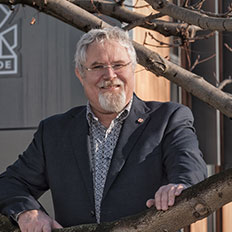7 reasons for hope

Professor Richie Poulton:
“The bottom line … people are far stronger, adaptable and dignified in the face of adversity than they give themselves credit for.”
The COVID-19 pandemic has catapulted us into unfamiliar territory. However, research and history show we have the inherent resilience to cope.
The University of Otago's Professor Richie Poulton, director of the Dunedin Multidisciplinary Health and Development Study and chief science adviser to the Social Wellbeing Agency, together with Atawhai Tibble, the Social Wellbeing's Agency's chief Māori adviser, believe there are seven good reasons to be hopeful as we – and the rest of the world – wait for a COVID-19 vaccine.
1
While anxiety and a sense of helplessness are legitimate responses to the unpredictability of the COVID-19 virus, Poulton and Tibble believe we are more resilient than we might think. They cite the example of the Blitz during World War Two in which the Germans repeatedly bombed London while civilians hid in underground bunkers, not knowing where the next bomb would fall.
“At the time is was assumed that many would emerge from these horrors permanently psychologically damaged, yet the opposite occurred. Most came through pretty much unscathed in the psychological sense. It seems human beings are far more resilient to existential threatening challenges than we typically assume.”
2
This is reinforced by the findings of the long-running Dunedin Study. These show that people who have coped with great adversity not only get on with life, but also regularly contribute to the study (often at emotional cost to themselves) simply because it might help others.
“The bottom line… people are far stronger, adaptable and dignified in the face of adversity than they give themselves credit for. Knowing this should embolden all of us in this time of great adversity.”
3
Our DNA gives us good reason for hope. Whether they were Polynesian voyagers or those who boarded ships in Great Britain, our descendants all faced a new and unfamiliar land. They learned to be brave and caring, with the vision, positivity and innovation to fashion a new life. Our whānau have overcome enormous challenges on a regular basis – world wars, the Spanish 'flu, land confiscations, the Great Depression – we can be inspired by them. “They helped turn resilience into a lifestyle choice. And we can do it again.”
4
We are lucky to live in a digital world which enables us to maintain social connection. While digital connection can never replace the real thing, it does help us mitigate the risks of social isolation and social fragmentation.
5
Amazing stories from the present show that, despite personal sacrifices and challenges, we can unite and work together for the common good. Building on the ANZAC spirit, Poulton and Tibble say this may be the one moment in which Māori constructs such as manawaroa (courage in adversity) and piripino (commitment to a shared purpose) become the values that all New Zealanders can embrace.
“We seem better equipped than most nations to pull this off.”
6
Our remote location was once perceived as a negative in our national psyche: now it is our strength. Physical distancing is like a behavioural vaccine and, when done correctly, can be almost as effective as a biological vaccine.
7
COVID-19 represents a massive, disorienting threat to people all around the world, but the “good news” is that the best therapeutic approaches for dealing with extreme anxiety and sadness are just a few key-strokes away. E-therapy approaches are supported by dozens of gold-standard controlled trials showing that they are just as effective as standard face-to-face therapy treatments and are available to anyone who has the internet.
Funding
- Social Wellbeing Agency
- University of Otago
Prev: Bioethics of a pandemic
